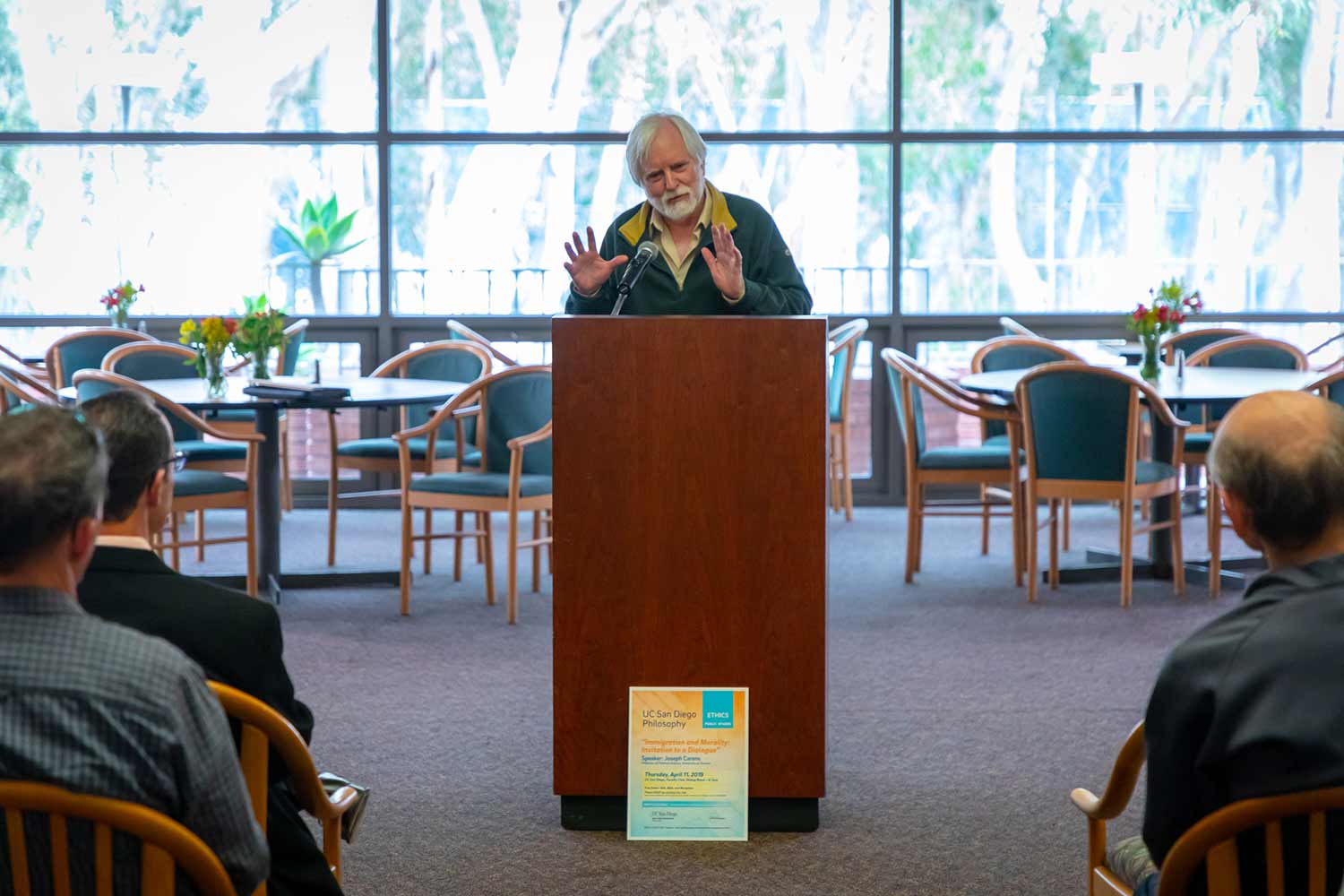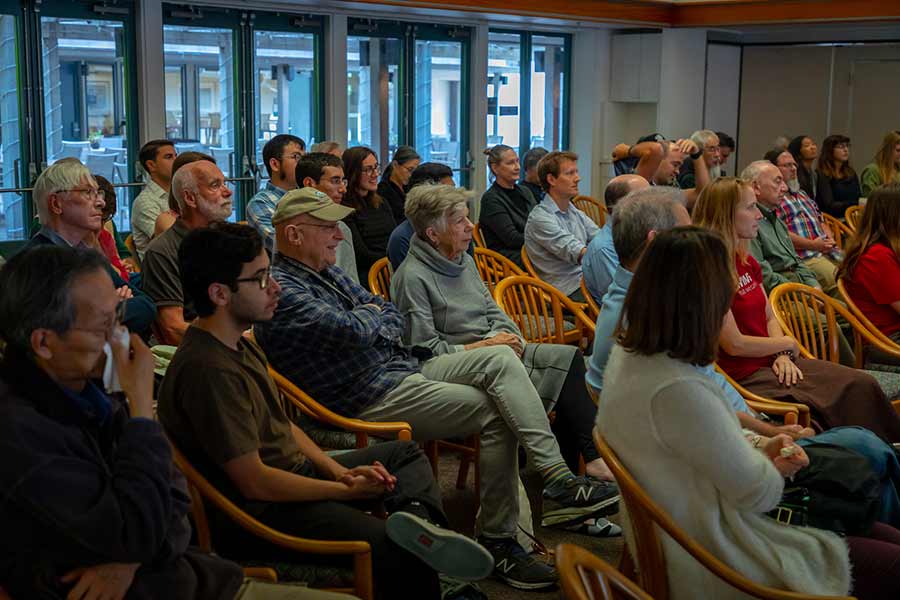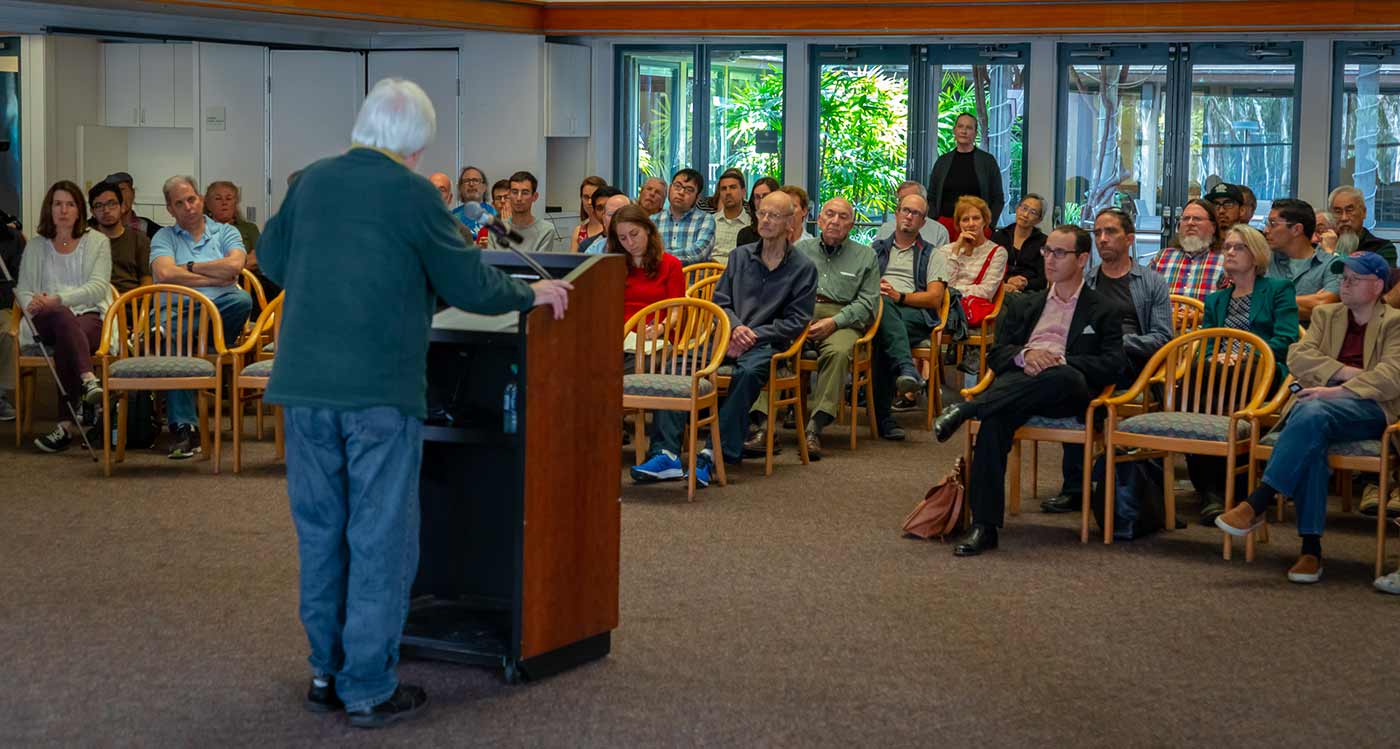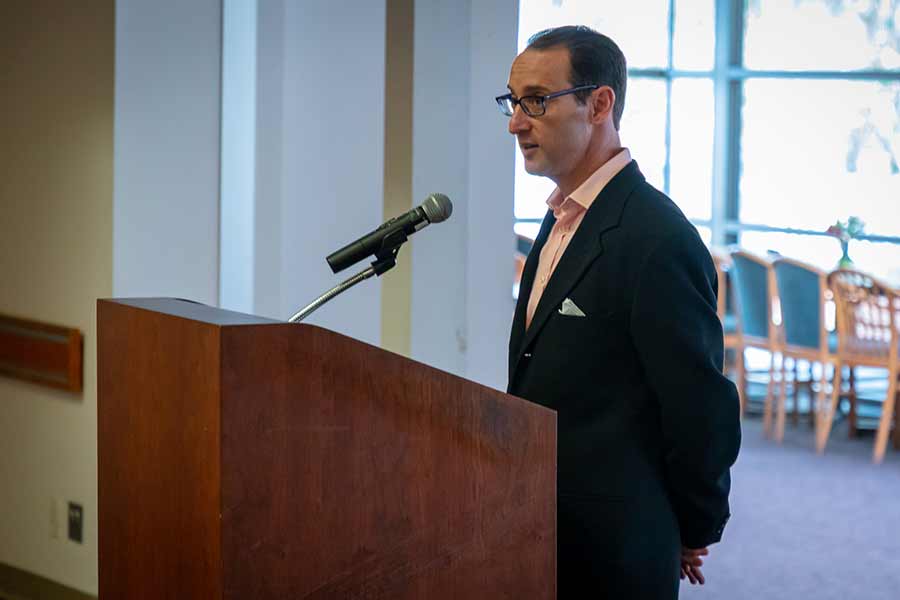By:
- Anthony King
Published Date
By:
- Anthony King
Share This:

Joseph Carens was the guest speaker for the April 11 Ethics in the Public Sphere. Photos by Patrick Hennessey/ Division of Arts and Humanities.
Should There Be Open Borders?
Department of Philosophy distinguished lecture series brings timely—and ethical—discussion of immigration to campus
With more than 258 million migrants living outside their country of birth, the United Nations Foundation says the number of international migrants has grown by 49% since 2000, and nearly half are women. In 2018, more than 3,000 people died or went missing on migratory routes; these stats raise questions about the moral responsibility countries face in addressing a global crisis.
In the latest Ethics in the Public Sphere discussion from the UC San Diego Department of Philosophy, Joseph Carens argued that democracies do, in fact, require welcoming immigrants, and that by applying an ethical or moral view to migrants and refugees, individuals can think about immigration at a deeper level.
“In my view, borders should be generally open and people should normally be free to leave their country of origin and settle wherever they choose,” Carens said in his talk “Immigration and Morality: Invitation to a Dialogue” at the Ida and Cecil Green Faculty Club on April 11, just one week after the United States president threatened to close the U.S.-Mexico border.
“In many ways, citizenship in Western democracies is the modern equivalent of feudal class privilege. It’s an inherited status that greatly enhances one’s life chances,” he said. “Like feudal birthright privileges, contemporary arrangements grant great advantages on the basis of birth, and then entrench those advantages by legally restricting mobility.”

The public event was held at the Ida and Cecil Green Faculty Club.
Carens is a professor at the University of Toronto and a leading scholar on the ethics of migration and immigration. He is the author of “Culture, Citizenship, and Community,” which won the C.B. Macpherson Prize, and “The Ethics of Immigration,” among other groundbreaking work.
“If the feudal practices of protecting birthright were wrong, what justifies the modern ones?” he said.
Carens primarily discussed immigration into rich, democratic countries like the United States, Canada and parts of Europe, saying these have a stated commitment to basic democratic principles or values: all humans are created equal, there is a duty to respect rights and freedoms of all people, discrimination on the basis of race, religion and gender is wrong, among others.
And while he did say governments have the right to exercise control over their own immigration, this should not happen at the expense of stripping individuals of these basic principles. He argues for stronger adherence to systems that protect migrants and refugees, citizenship for descendants of immigrants, and full inclusion of migrants into established communities.
“Immigrants and their descendants are entitled to expect that they will have equal access to social, economic and political opportunities, and they won’t be required to abandon their previous identities and commitments to do so,” he said.

“My hope is that putting these ideas on the table will appeal to the better of our nature,” Carens said.
A political scientist, Carens said it makes sense to discuss immigration from a philosophical perspective. These are not just political issues, he said, but moral ones as well, and “shielding” these policies from moral scrutiny is misguided. He cited archaic policies that barred naturalization based on race, which most people today oppose as morally wrong.
“The reasons people gave for refusing to admit Jewish refugees [after World War II] are the same reasons you hear today for refusing admittance to refugees,” he said. “Most people in democratic states recognized the exclusion of Jewish refugees had been a terrible moral failure, and we vowed never to let it happen again.
“My hope is that putting these ideas on the table will appeal to the better of our nature. In the [United States], there is a long tradition of welcoming immigrants, and that’s something to be proud of,” he said. “The best way to address the problem is to transform the world so that inequalities are reduced.”

Jonathan Cohen, Department of Philosophy chair.
Exploring ethical challenges facing contemporary society, the Department of Philosophy brings relevant and timely topics to the forefront for greater understanding and discussion through their distinguished lecture series, Ethics in the Public Sphere. Established in 2012, the series is a forum to bring to light the discussions and debates where ethics and public life intersect.
“There is often discussion and debate of topical ethical and social-political issues on campus, but philosophy faculty and graduate students are only seldom involved,” said professor Donald Rutherford, founder of the series. “We can get people thinking and talking about the issues, and get students excited about the possibility of philosophy as a major.”
Previous talks include a historical and political look at the Paris Climate Agreement, a discussion regarding responsibility in the #MeToo movement, sustaining democracy around the world and ethics in war. In 2013, a panel was assembled to discuss the true aims of education, looking at education standards and human values, charter school and justice, and molding conscientious students.
“The series is an opportunity for philosophy to engage the campus, the community and the world on issues of broad concern where ethics intersects public life,” said Jonathan Cohen, professor of philosophy and department chair. “These are issues for everyone—society at large—and philosophers in particular can add to these conversations by applying considerations that wouldn’t otherwise be part of the discussion, and thereby enrich the public conversation in important ways.”
Share This:
Stay in the Know
Keep up with all the latest from UC San Diego. Subscribe to the newsletter today.



